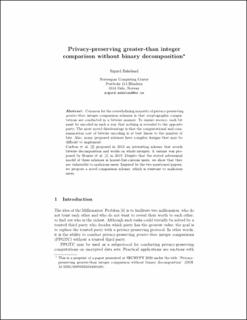| dc.contributor.author | Eskeland, Sigurd | |
| dc.date.accessioned | 2020-10-09T16:00:17Z | |
| dc.date.available | 2020-10-09T16:00:17Z | |
| dc.date.issued | 2020 | |
| dc.identifier.citation | Eskeland S: Privacy-preserving greater-than integer comparison without binary decomposition. In: De Capitani di Vimercati, Obaidat MS, Samarati P, Ben-Othman J. SECRYPT 2020: Proceedings of the 17th International Joint Conference on e-Business and Telecommunications - (Volume 3), 2020. SciTePress p. 340-348 | |
| dc.identifier.isbn | 978-989-758-446-6 | |
| dc.identifier.uri | https://hdl.handle.net/11250/2682093 | |
| dc.description.abstract | Common for the overwhelming majority of privacy-preserving greater-than integer comparison schemes is that cryptographic computations are conducted in a bitwise manner. To ensure secrecy, each bit must be encoded in such a way that nothing is revealed to the opposite party. The most noted disadvantage is that the computational and communication cost of bitwise encoding is at best linear to the number of bits. Also, many proposed schemes have complex designs that may be difficult to implement. Carlton et al. proposed in 2018 an interesting scheme that avoids bitwise decomposition and works on whole integers. A variant was proposed by Bourse et al. in 2019. Despite that the stated adversarial model of these schemes is honest-but-curious users, we show that they are vulnerable to malicious users. Inspired by the two mentioned papers, we propose a novel comparison scheme, which is resistant to malicious users. | |
| dc.language.iso | eng | |
| dc.title | Privacy-preserving greater-than integer comparison without binary decomposition | |
| dc.type | Chapter | |
| dc.description.version | submittedVersion | |
| dc.identifier.doi | 10.5220/0009822403400348 | |
| dc.identifier.cristin | 1838551 | |
| dc.relation.project | Norges forskningsråd: 194067 | |
